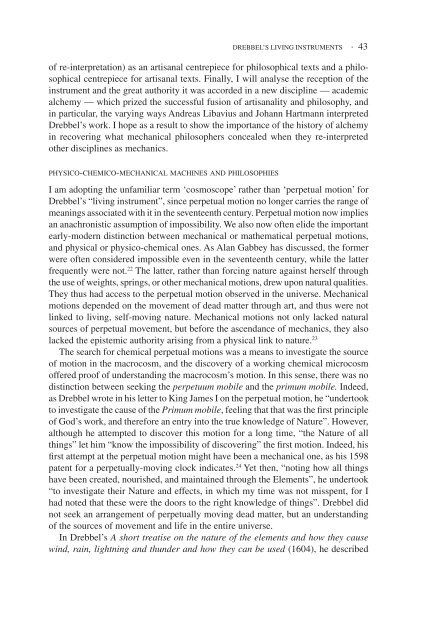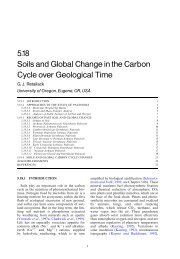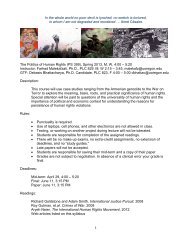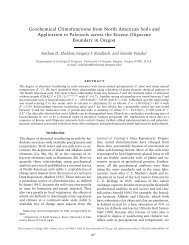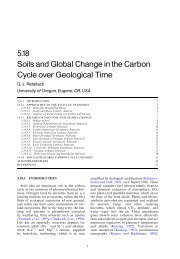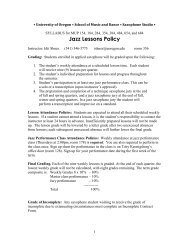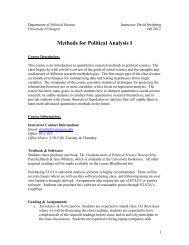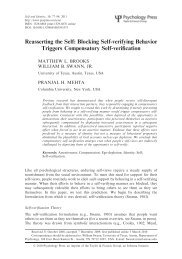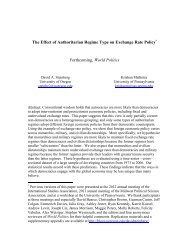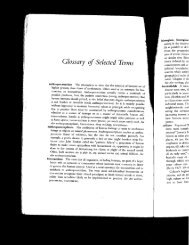drebbel's living instruments, hartmann's microcosm, and libavius's ...
drebbel's living instruments, hartmann's microcosm, and libavius's ...
drebbel's living instruments, hartmann's microcosm, and libavius's ...
You also want an ePaper? Increase the reach of your titles
YUMPU automatically turns print PDFs into web optimized ePapers that Google loves.
DREBBEL’S LIVING INSTRUMENTS · 43of re-interpretation) as an artisanal centrepiece for philosophical texts <strong>and</strong> a philosophicalcentrepiece for artisanal texts. Finally, I will analyse the reception of theinstrument <strong>and</strong> the great authority it was accorded in a new discipline — academicalchemy — which prized the successful fusion of artisanality <strong>and</strong> philosophy, <strong>and</strong>in particular, the varying ways Andreas Libavius <strong>and</strong> Johann Hartmann interpretedDrebbel’s work. I hope as a result to show the importance of the history of alchemyin recovering what mechanical philosophers concealed when they re-interpretedother disciplines as mechanics.PHYSICO-CHEMICO-MECHANICAL MACHINES AND PHILOSOPHIESI am adopting the unfamiliar term ‘cosmoscope’ rather than ‘perpetual motion’ forDrebbel’s “<strong>living</strong> instrument”, since perpetual motion no longer carries the range ofmeanings associated with it in the seventeenth century. Perpetual motion now impliesan anachronistic assumption of impossibility. We also now often elide the importantearly-modern distinction between mechanical or mathematical perpetual motions,<strong>and</strong> physical or physico-chemical ones. As Alan Gabbey has discussed, the formerwere often considered impossible even in the seventeenth century, while the latterfrequently were not. 22 The latter, rather than forcing nature against herself throughthe use of weights, springs, or other mechanical motions, drew upon natural qualities.They thus had access to the perpetual motion observed in the universe. Mechanicalmotions depended on the movement of dead matter through art, <strong>and</strong> thus were notlinked to <strong>living</strong>, self-moving nature. Mechanical motions not only lacked naturalsources of perpetual movement, but before the ascendance of mechanics, they alsolacked the epistemic authority arising from a physical link to nature. 23The search for chemical perpetual motions was a means to investigate the sourceof motion in the macrocosm, <strong>and</strong> the discovery of a working chemical <strong>microcosm</strong>offered proof of underst<strong>and</strong>ing the macrocosm’s motion. In this sense, there was nodistinction between seeking the perpetuum mobile <strong>and</strong> the primum mobile. Indeed,as Drebbel wrote in his letter to King James I on the perpetual motion, he “undertookto investigate the cause of the Primum mobile, feeling that that was the first principleof God’s work, <strong>and</strong> therefore an entry into the true knowledge of Nature”. However,although he attempted to discover this motion for a long time, “the Nature of allthings” let him “know the impossibility of discovering” the first motion. Indeed, hisfirst attempt at the perpetual motion might have been a mechanical one, as his 1598patent for a perpetually-moving clock indicates. 24 Yet then, “noting how all thingshave been created, nourished, <strong>and</strong> maintained through the Elements”, he undertook“to investigate their Nature <strong>and</strong> effects, in which my time was not misspent, for Ihad noted that these were the doors to the right knowledge of things”. Drebbel didnot seek an arrangement of perpetually moving dead matter, but an underst<strong>and</strong>ingof the sources of movement <strong>and</strong> life in the entire universe.In Drebbel’s A short treatise on the nature of the elements <strong>and</strong> how they causewind, rain, lightning <strong>and</strong> thunder <strong>and</strong> how they can be used (1604), he described


